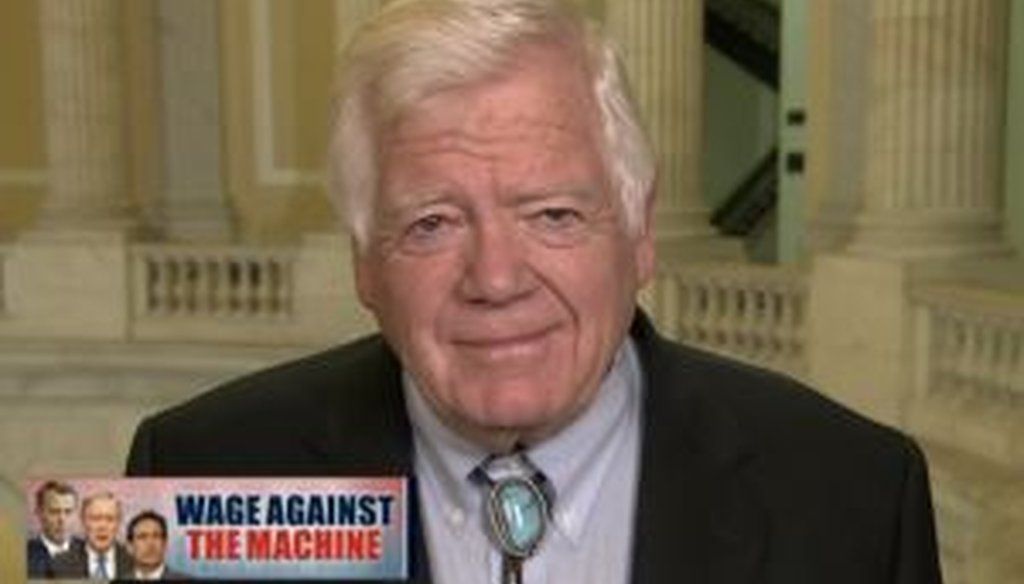

Our only agenda is to publish the truth so you can be an informed participant in democracy.
We need your help.


Rep. Jim McDermott, D-Wash., said on MSNBC that earning the minimum wage wouldn't get you half the way to the poverty level. Is that right?
A recent Gallup poll showed that an overwhelming 76 percent of Americans want the minimum wage increased to $9. There hasn’t been a minimum wage increase in four years, and the prospect of an increase -- particularly in the Republican-controlled House -- looks dim.
But that hasn’t stopped advocates of a higher minimum wage from making their case.
In a recent interview with the Rev. Al Sharpton on MSNBC, Rep. Jim McDermott, D-Wash., said that at its current level, the minimum wage is inadequate for making an acceptable living.
"The minimum wage at the federal level has been frozen for four years at $7.75," he said on Nov. 12, 2013. "In the state of Washington, we’ve raised it to $9.15 and people there took it in their own hands and said, let’s go to $15 because people have gotten fed up with Washington, D.C. They don’t expect a thing to come out of Congress. … On $7.75 you can’t even make half the poverty level. You’ve got to have two jobs. You have to work 80 hours a week."
We wondered: Is it true that if you are paid $7.75 an hour, "you can't even make half the poverty level?"
First off, we need to correct one aspect of McDermott’s claim.While he’s right that the federal minimum wage has been static for the past four years, it’s $7.25 an hour, not $7.75. But because he was specific about the dollar amount, we’ll use that to make our calculations.
If you earned $7.75 an hour for 40 hours a week and 52 weeks a year, you would earn $16,120. For this to be less than half the poverty level, the poverty level would have to be at least $32,240.
Is the poverty level that high? For most households, no.
The federal poverty level is actually a matrix of different dollar amounts. It depends on the size of the family, with larger families having a higher threshold.
The poverty level only exceeds $32,240 for families with at least seven people -- say, two parents and five children, or one parent and six children. (For a seven-person household, an income of $35,610 is right at the poverty level.) If we were to use the actual minimum wage of $7.25, the yearly income would be less than half of poverty for a six-person family, rather than seven.
It’s worth noting that seven-person households are a small fraction of all households.
According to the Census Bureau, only 9 percent of households have even three children, and the number with five (or six, if it's a single-parent household) is even smaller. Extrapolating from 2006 data, we estimate that about 2 percent of households have at least five children.
So, McDermott’s claim would be wrong for 98 percent of households. And this may even understate how wrong he is.
Under the federal Earned Income Tax Credit -- which provides a refundable tax credit to working people with low incomes -- a poverty-level household with two adults and two children would be eligible for $5,372 in tax credits, noted Michael Wiseman, a professor of public policy and economics at George Washington University. That would make McDermott’s scenario even more far-fetched.
A spokeswoman for McDermott acknowledged that he "misspoke," both about the amount of the federal minimum wage and about how far that wage would go.
"The point he was trying to make was that the current minimum wage is nowhere close to a livable wage," said spokeswoman Amber Macdonald.
Our ruling
McDermott said that "on (the federal minimum wage of) $7.75, you can’t even make half the poverty level." He’s wrong about what the federal minimum wage is -- it’s $7.25. And for about 98 percent of households, he’s wrong that a year of working at that wage rate wouldn’t even get you to half of the poverty level. We rate his statement False.
Jim McDermott, D-Wash., interview on Rev. Al Sharpton’s Politics Nation on MSNBC, Nov. 12, 2013
Families USA, "2013 Federal Poverty Guidelines," accessed Nov. 14, 2013
U.S. Labor Department, "Minimum Wage Laws in the States," Jan. 1, 2013
U.S. Labor Department, "History of Federal Minimum Wage Rates Under the Fair Labor Standards Act," accessed Nov. 14, 2013
U.S. Census Bureau, "Table 64. Family Households by Number of Own Children Under 18 Years of Age: 2000 to 2010," accessed Nov. 14, 2013
U.S. Census Bureau, "Poverty Thresholds based on National Academy of Sciences Recommendations, 1999-2012," accessed Nov. 14, 2013
Infoplease, "U.S. Households by Size, 1790–2006," accessed Nov. 14, 2013
Politico, "Poll: Most back $9 minimum wage," Nov. 11, 2013
Email interview with Michael Wiseman, a professor of public policy and economics at George Washington University, Nov. 14, 2013
Email interview with Gary Steinberg, spokesman for the Bureau of Labor Statistics, Nov. 14, 2013
In a world of wild talk and fake news, help us stand up for the facts.
